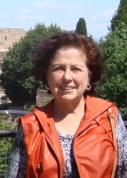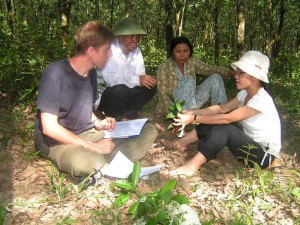Originally published at Bioversity International
Maria Fernandez, Honorary Research Fellow, Bioversity International, introduces this new video, in which young scientists talk about the challenges they faced doing participatory research and how they worked creatively to overcome them.

Rural communities manage natural resources under diverse and changing landscape and market conditions throughout the developing world. Over the past 20 years scientists, concerned with the sustainability of smallholder farm and forest resilience have become increasingly aware of the need to link research for development with the needs and experiences of these communities. Our scientists are challenging themselves to find, develop and use gender-responsive participatory research methods and tools to listen to the voices of different groups of actors and generate high quality and useful science.
Participatory research is about providing local people with opportunities to share their knowledge and experience with each other while also sharing it with researchers. It is about tackling problems that are relevant to communities in ways that draw on their own successful experiences and knowledge and integrating them with a conventional scientific perspective. Doing successful participatory research entails acquiring a set of skills.
Bioversity International’s Gender Research Fellowship Programme which ran from 2013-14, provided an opportunity for five Research Fellows affiliated with national partner institutes to take these skills on board and use them to enhance the gender responsiveness of their Bioversity International projects.
The video Revealing farmers’ knowledge through research gives a window into the experiences of these Fellows as they took on the challenge. Two messages are evident in the film. First, participatory research can give a voice to those who are often not heard. Second, the Fellows themselves were surprised and transformed by facilitating this kind of co-learning process.
The video identifies a number of challenges the Fellows faced doing their research and how they worked creatively to overcome them:

Researchers need to gain experience with participatory-research tools. Choosing the most appropriate tools is a challenge as there are many to choose between. A good researcher will choose a few tools designed to give a voice to those who don’t know that they have knowledge to share or are not accustomed to being listened to.
Also read the blog: Case studies from around the globe show that gender-responsive participatory research is the way to go
Working with gender-differentiated groups brings out invisible, insider knowledge. Once men and women have worked in separate groups and they come together in plenary to share their results, it most often becomes evident that women and men have been looking at issues differently. This experience enriches and deepens knowledge and often results in concrete actions and changes.
Quantification of information takes creativity and the use of appropriate tools. When qualitative data, such as farmers’ knowledge, is made visible using tools like scoring, it can be put into graphs. In addition to graphs there are a number of tested tools that can help represent qualitative information graphically.
Participatory research processes can increase self-esteem and build confidence when people (especially women) find out they know more than they thought they did, can do things they didn’t think they could do and are being recognized for their knowledge. People who speak only indigenous languages, often women and marginalized groups, tend to be left out of development discussions.
Research processes that give them space to express their knowledge can be empowering, and allow scientists to learn from them.
Increased confidence and empowerment contribute to equality. When men and women from diverse social and ethnic groups are given access to knowledge about each others’ skills, needs and experiences, it increases mutual respect and opens the door for innovation. They learn things about each other that they didn’t know and talk about things they had never talked about. We found this with research in India bringing together diverse social and ethnic groups, and in Malaysia bringing together women and men.
Good gender-responsive participatory research requires a commitment to learning new skills and finding ways to listen to less articulate or more marginalized groups. It is a journey that changes us as professionals and makes our research more relevant to the future we are working towards.
This research was carried out in collaboration with the CGIAR Research Program on Forests, Trees and Agroforestry, and is part of Bioversity International’s Initiative on Effective Genetic Resources Conservation and Use











